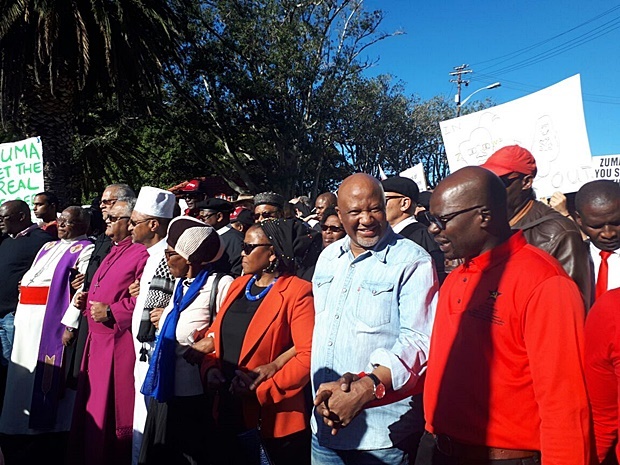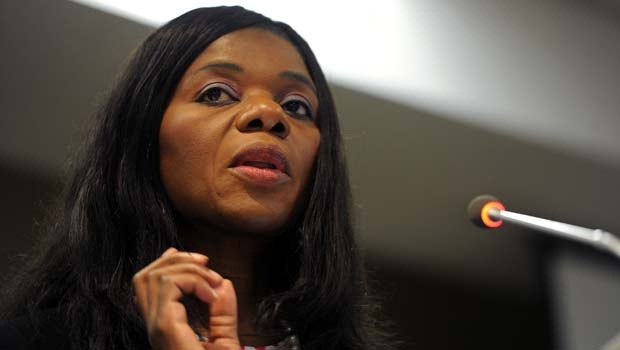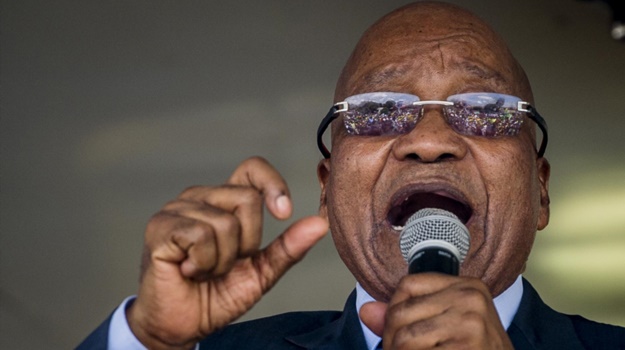In March 2016, then deputy finance minister Mcebisi Jonas released a statement to "clarify certain questions", following reports that he had met with the Gupta family just weeks before Nhlanhla Nene was fired as finance minister by former president Jacob Zuma.
Jonas' astonishing revelation was the first in a series of explosive claims made by several officials and party members whose claims placed Zuma and his close associates at the centre of allegations of a well orchestrated plan to loot taxpayers' money through the country's state-owned enterprises (SOEs).
He claimed that members of the influential Gupta family had offered him R600m, starting with R600 000 in cash, if he took Nene's job. Nene, who was reappointed finance minister in February by Zuma's successor Cyril Ramaphosa, was removed from the portfolio on December 9, 2015, in favour of the lesser known Des Van Rooyen.
Uproar over this appointment resulted in Van Rooyen lasting just three days in the job.
After Jonas's confession, former ANC Member of Parliament Vytjie Mentor made an even more startling claim on Facebook. Responding to DA member Johan Abrie, she claimed that the Gupta family had offered her a post as public enterprises minister, just before Barbara Hogan was ousted.
In turn, she said the Guptas wanted her to drop the South African Airways' lucrative route to India in favour of the Guptas' Jet Airways.
Mentor said she had been flown to Johannesburg from Cape Town to meet with the family at its Saxonwold home, She claims that Zuma was also in the house at the time and had later walked her out after she rejected the offer. The Presidency, however, not only denied the allegations, but claimed that Zuma had no recollection of Mentor.
The Sunday Times followed the claims by the two with a report that former CEO of government communications and information systems Themba Maseko had received a call from Zuma, who allegedly said to him: "These Gupta guys… need your help."
Maseko was asked to meet with the brothers, who ordered him to put all government advertising in their newly launched newspaper The New Age. The Guptas told him to tell all departments to channel money their way, saying if they refused they would deal with them.
(Former deputy finance minister Mcebisi Jonas marches with civil society leaders against state capture. Photo: Jenni Evans/News24)
Opposition parties take action
Within just days of the damning revelations, DA leader Mmusi Maimane approached former public protector Thuli Madonsela, asking that she probe whether Zuma violated the Executive Members Ethics Act. The request was followed by several others.
While the former public protector investigated the matter public debate over the issue continued.
The EFF noted Jonas' claims and went on to accuse Zuma and his associates of turning the country into a "Gupta republic". The party further went on to name the likes of former mineral resources minister Mosebenzi Zwane, home affairs minister Malusi Gigaba and suspended South African Revenue Services commissioner Tom Moyane as part of the state capture network.
The red berets claimed billions were being moved out of the country by the Guptas, with Zuma's assistance, to various tax havens including Dubai. It also said it had lodged complaints with various crime fighting institutions over the matter.
In October 2016, Julius Malema told journalists he had made submissions to Madonsela. He refused to be interviewed by Zuma, who had requested that the public protector should not wrap up the investigation until he was allowed to question other witnesses in the matter.
The EFF during this time also refused to engage with journalists from ANN7 and The New Age, which were both Gupta owned. The party's deputy president, Floyd Shivambu, even refused to be interviewed by one of the media house's journalists during the 2016 local government elections.
South Africans and civil society come to the Gupta party
The past two years seemed to present South Africa with a different scandal every week. It also saw former finance minister Pravin Gordhan facing fraud charges from the National Prosecuting Authority (NPA), which were dropped at the last minute following a series of protests, court challenges and calls for the president to step down.
Gordhan was fired by Zuma in March 2017, based on a so-called intelligence report, which some from the former president's own political party described as "nonsense".
Three members of the ANC's top six distanced themselves from the decision to axe Gordhan. This development, which affected South Africa's ailing economy, sparked several marches calling for Zuma to step down.
Churches, academics and civil society also weighed in on what felt like the "upside down" state of the country, with growing calls for Zuma to go. In May 2017, the South African Council of Churches (SACC) warned that the country risked collapsing if the ANC did not act on the "systematic siphoning of state assets pivoted around President Jacob Zuma". The SACC launched its "Unburdening Panel" report that put together damning allegations of corruption in various multibillion-rand tenders.
In the same month, a group of academics released a report titled "Betrayal of the Promise: How South Africa is being stolen", detailing the establishment of a "parallel shadow state". The academics said South Africa had experienced "a silent coup" and also implicated Gigaba in their report.
(Former public protector, Thuli Madonsela.)
Businesses wrangled in Gupta scandal
Accounting firm KPMG is one of the multinational companies that is still reeling from its involvement with the Guptas. To date, the firm has failed to recover from both the reputational damage and continuing loss of business. Beyond being accused of assisting the Guptas to siphon money out of the country and dodging taxes, KPMG is understood to have played an enabling role through producing a fabricated forensic report for a covert SARS anti-corruption unit.
German software firm SAP admitted to having paid R128.6m to businesses linked to the Guptas to win government contracts.
Global consulting firm McKinsey and Gupta linked Trillion Capital pocketed R1.6bn after being contracted to turn around embattled electricity provider Eskom. The former has gone on to apologise for its role in state capture and, in July 2018, agreed to pay back R902m it had made from the unlawful deal.
However, organisations like Business Leadership South Africa (BLSA) have been vocal in their criticism of companies implicated in the Gupta web and vowed to fight until all associated with the looting of the state are behind bars.
BLSA's CEO Bonang Mohale said it believed the notorious family had siphoned, on average, R100bn a year from the country over the past ten years.
The Black Business Council (BBC) also previously rejected a suggestion by its former head of policy Mzwanele Manyi for the Guptas to join the organisation. The offer was coupled with a once-off R5m donation and a R1m monthly contribution from the family.
International propaganda machine
Powerful British PR company Bell Pottinger, which was believed to have been given a brief by the former president's son Duduzane Zuma, was accused of stoking racial hatred and spreading "fake news" in South Africa in its work for Gupta-owned Oakbay Investments.
It's understood that a disinformation campaign by the PR company had been established, which included using The New Age newspaper and ANN7 news channel, as well as alternative news sites such as Weekly Expose, Black Opinion and Uncensored. The "alternative facts" campaign was pushed by people such as Black First Land First's Andile Mngxitama and the ANC Youth League.
The PR firm struggled to manage the fallout from its work on the controversial account, which eventually saw it being forced into administration after it was expelled from the UK's public relations and communications association for contravening its ethical code.
The republic ruled by the courts
Numerous court battles also played out, with the judiciary having to rule on a decision by South Africa's big four banks to stop doing business with the Guptas, and numerous court challenges brought against and by Zuma over Madonsela's State of Capture report. The most notable was Zuma's attempt to prevent the report from being made public. The report recommended a judicial commission of inquiry with the same powers as the Chapter Nine institution.
Zuma then ditched the application, leading to the report being released just a day before Madonsela's seven-year-term ended.
The media and the #GuptaLeaks
South Africa's media have largely been praised for their role in exposing the state capture project. President Cyril Ramaphosa claimed that it was the thousands of leaked emails from within the Gupta empire, which became known as the #Guptaleaks, that made him realise the country was dealing with "a much bigger problem" than he ever imagined.
(Former president Jacob Zuma.)
The ANC, its alliance and the Guptas
The SACP never shifted from its warnings that there was a parasitic network seeking to destroy the state. This led to its call for the ANC, leader of the tripartite alliance, to recall its president as head of state.
The call was repeated by the country's largest trade union federation, Cosatu. It also resulted in the federation's members booing Zuma and refusing to be addressed by him at a Workers Day rally on May 1, 2017, in Bloemfontein.
Although the ANC attempted to downplay the role of the Guptas, the party was forced to confront the issue when then secretary general Gwede Mantashe spoke of corporate capture by the Guptas in "a diagnostics organisational report" during the party's June policy conference in 2017.
Before the outright admission of "corporate capture", the ANC's NEC attempted to investigate the close relationship between Zuma and the Guptas and whether it started the capture of state project. Members were asked as far back as 2016 to approach Mantashe with their testimonies, but only Maseko gave written evidence, with several others opting to wait on Madonsela's investigation. Numerous ANC leaders have also been vocal about the influence of the Gupta family in party affairs.
Last year, former finance minister Trevor Manuel, in an open letter to the party's head of elections Fikile Mbalula, reminded him of a NEC meeting where the latter apparently had tears streaming down his face as he told his comrades of a call he had received from Atul Gupta telling him he was promoted from sports minister to police minister, a claim which Zuma apparently confirmed when he reshuffled Cabinet days later.
In November 2016, numerous stalwarts who had been reaching out to leaders in the ANC over a number of concerns - including state capture claims and calls for Zuma to go - decided to go public with their criticism of Zuma and his NEC. They called themselves the 101 stalwarts.
The following month, former generals and commissars of the ANC's liberation army Umkhonto we Sizwe also formed a structure called the MK Council to express their views on the state capture allegations and the leadership of the 106-year-old organisation.
ANC Youth League president Collen Maine admitted to having been introduced to the Guptas. His confession, however, fingered former North West premier Supra Mahumapelo as the person who kickstarted that relationship. The confession only took place a few months ago, long after the release of the state of capture report.
Even some of Zuma's well-known allies, such Ekurhuleni mayor Mzwandile Masina and KwaZulu-Natal chairperson Sihle Zikalala, made public pronouncements seeking to distance the former leader from the Guptas.
The #GuptaLeaks seemed to be what broke the camel's back when it came to Zuma's hold on the ANC. His fate as head of state was sealed when Ramaphosa emerged as a victor at the party's watershed elective conference in December.
Just two months after the conference, Zuma was recalled as president of the country by the ANC's NEC. He stepped down in a late-night address to the nation on February 14.
Before then he had survived numerous attempts to oust him, the first in the NEC and again in Parliament, where no less than eight motions of no confidence had been brought against him.
Several leaders in the country have emphasised the importance of the former president appearing at the state capture commission of inquiry which kicked off on Monday. The Sunday Times reported that Deputy Chief Justice Raymond Zondo had written to Zuma, asking him to give his side of the story.




 Publications
Publications
 Partners
Partners


























